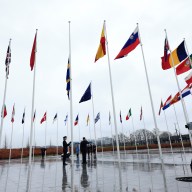‘City of Gold’ “City of Gold” isn’t food porn. Or rather, it’s that, too: There’s a fair amount of hanging in restaurants and slurping down of hot-off-the-greasy-grill food truck tacos. That’s to expected, this being a doc about Jonathan Gold, the much-esteemed food critic at the Los Angeles Times (and formerly L.A. Weekly, Gourmet and others). What should also be expected, though, is that any movie about L.A. food would be equally, if not more, about the countless cultures that birthed them. It’s less a documentary version of “Babette’s Feast” than an old-fashioned city symphony, and to a city often wholly misrepresented by the movies. RELATED: Interview: Jonathan Gold on “City of Gold,” Los Angeles, gentrification and one food he hates One of Gold’s main focuses has long been the mom-and-pop hole-in-the-walls that dot the city’s many ethnic enclaves. He steers readers to the cheap but mind-blowing street food that hasn’t yet been co-opted by big-time chefs (with a hefty rise in price, natch). “City of Gold” doesn’t get into the other side of this — that is, moneyed people “sampling” lower income cultures. That’s probably because Gold’s intentions are noble, even utopian: He sees the city not as a playground for the rich but a mass mesh of diversity that begs to be melded, not conquered. He wants to drive people to lesser-known establishments, but also to get different cultures into a dialogue. He wants, as he says late in, to be invited into their homes for a meal. Director Laura Gabbert gets that, and despite offering untold chances to jot down restaurant names — please put Jitlada, one of Thai Town’s finest, high up on your next L.A. itinerary — she devotes more time to showing the usually un-shown parts of the melting pot metropolis. The L.A. of motion pictures tends to be erroneous: Usually it’s either a shape-shifter, posing as other cities, or a hellscape where the desperate and debauched go to destroy themselves and others. To those who live there and really use the sprawling city limits, it’s neither of these. It’s a mass of neighborhoods, each with their own mass of identities. RELATED: Interview: Reggie Watts talks the film “Creative Control” and the “underdog” “Late Late Show” “City of Gold” doesn’t have the time to devote too much time to each place, though each spot could make for a documentary on its own. (It’s unfair to compare it to “In Jackson Heights,” Frederick Wiseman’s three-hour stew in a particularly diverse part of Queens, New York, though they’re spiritual cousins.) She uses Gold both as a host and as a sieve, concentrating it into a story that’s bigger than him, bigger than food and bigger, even, than L.A. and its throngs of occupants. It becomes a cosmic story about how to live life as an explorer, even just an urban one, poking around the parts of your home you tend to ignore. Gold no longer clings to his food critic anonymity, and scenes on the job involve paired or group meals, plus chatter with the staff and owners. (There’s just enough breakdown of how he does his job to not overwhelm the film, but it’s good to know he visits each place multiple times, and his record is 17 trips to the same joint before writing it up.) Without overtly trying, “City of Gold” winds up quietly arguing for the same thing as A.O. Scott’s new book “Better Living Through Criticism”: that the job of a critic requires a mixture of judgment and empathy, and that reviewing at its best articulates what the artist has done, not just whether one likes it or not. It understands that the role of the critic is usually an accidental one, though that doesn’t discount its importance. Indeed, imbibing art, including food, thinking about it in critical ways and directing the population to wares off-the-beaten path or not christened by commerce or advertising is — looking at Gold’s childlike smile as he visits place after place — a pretty great way to spend one’s life.
Director: Laura Gabbert
Genre: Documentary
Rating: R
4 (out of 5) Globes
‘City of Gold’ is as much about L.A. food as it is about L.A. life
Follow Matt Prigge on Twitter @mattprigge


















